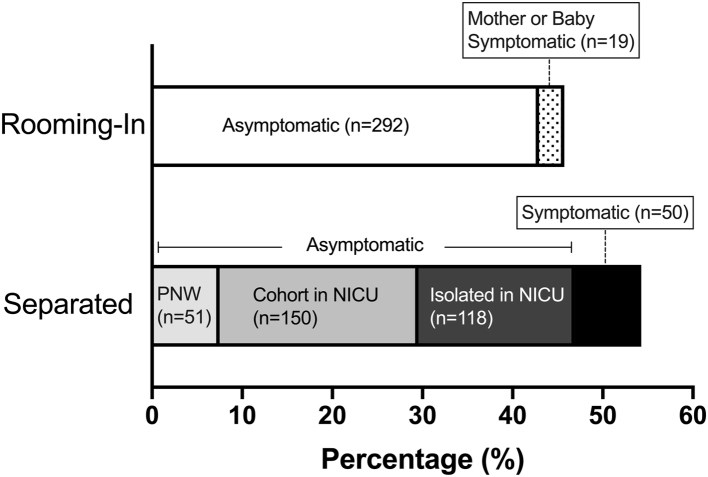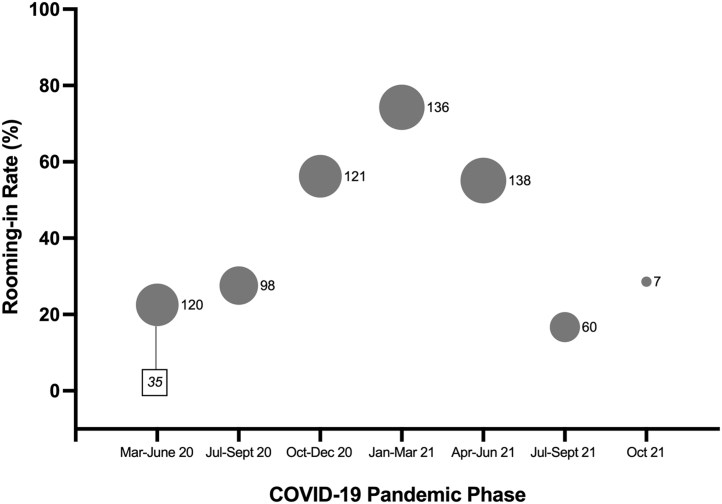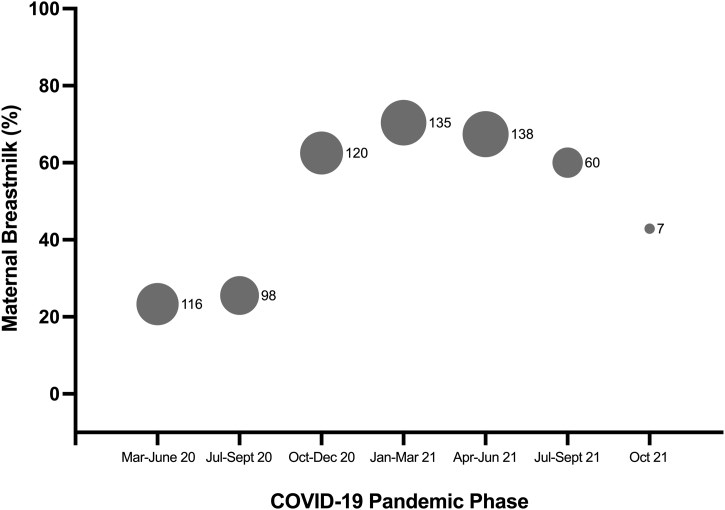Born into an isolating world: family-centred care for babies born to mothers with COVID-19
G Dowse 1 2, E J Perkins 1, H M Stein 3, G Chidini 4, O Danhaive 5 6, Y N Elsayed 7, W B Carvalho 8, N AlNaqeeb 9, S Rooze 10, M Cetinkaya 11, S Vetter-Laracy 12, F J Pilar-Orive 13, P Torpiano 14, W A Gonçalves Ferri 15, D Buonsenso 16, B Rogdo 17, A Medina 18, A Polito 19, C N M Brouwer 20, M C J Kneyber 21 22, D De Luca 23 24, D G Tingay 1 2; ESPNIC COVID-19 Paediatric and Neonatal (EPICENTRE) Registry
Affiliations
Affiliations
- Neonatal Research, Murdoch Children's Research Institute, Parkville, Australia.
- 2Department of Paediatrics, University of Melbourne, Melbourne, Australia.
- 3Department of Pediatrics, Division of Neonatology, Promedica Ebied Children's Hospital, Toledo, OH, USA.
- 4Department of Anaesthesia, Intensive Care and Emergency, Fondazione IRCCS Ca' Granda Ospedale Maggiore Policlinico, Milan, Italy.
- 5Division of Neonatology (Pediatrics), Catholic University of Louvain, Brussels, Belgium.
- 6Division of Neonatology (Pediatrics), University of California San Francisco, California, USA.
- 7Pediatrics, University of Manitoba, Winnipeg, Canada.
- 8Pediatric Intensive Care/Neonatology of the Department of Pediatrics, Faculty of Medicine, University of São Paulo, São Paulo, Brazil.
- 9Neonatal Department, AL-Adan Hospital, Ahmadi Area, Kuwait.
- 10Unités de Soins Intensifs, Hôpital Universitaire des Enfants Reine Fabiola, Laeken, Belgium.
- 11Health Sciences University, Department of Neonatology, Basaksehir Cam and Sakura City Hospital, Istanbul, Turkey.
- 12Division of Neonatology (Pediatrics), University Hospital Son Espases / Balearic Island Health Research Institute IdISBa, Palma, Spain.
- 13Pediatrics Department, PICU, Biocruces Bizkaia Health Research Institute, Cruces University Hospital, Barakaldo, Spain.
- 14Department of Paediatrics and Adolescent Health, Mater Dei Hospital, Msida, Malta.
- 15Department of Pediatrics, Ribeirão Preto Medical School - University of São Paulo, São Paulo State, Ribeirão Preto, Brazil.
- 16Department of Woman and Child Health and Public Health, Fondazione Policlinico Universitario A. Gemelli IRCCS, Rome, Italy.
- 17NICU/PICU, Children's Hospital of Eastern Switzerland, St Gallen, Switzerland.
- 18Pediatric Intensive Care Unit, University Hospital Central de Asturias, Oviedo, Spain.
- 19Department of Pediatrics, Gynecology and Obstetrics, University Hospital of Geneva, University of Geneva, Geneva, Switzerland.
- 20Pediatric Intensive Care Unit, Leiden University Medical Center, Leiden, the Netherlands.
- 21Department of Paediatrics, Division of Paediatric Critical Care Medicine, Beatrix Children's Hospital, Groningen, the Netherlands.
- 22Critical Care, Anesthesiology, Peri-operative & Emergency Medicine (CAPE), University Medical Center Groningen, the Netherlands.
- 23Division of Pediatrics and Neonatal Critical Care, "A.Béclère" Medical Centre, Paris Saclay University Hospitals, APHP, Paris, France.
- 24Physiopathology and Therapeutic Innovation Unit-INSERM U999, Paris Saclay University, Paris, France.
Abstract
Background: The benefits of facilitating breastmilk feeding and close contact between mother and neonate (family-centred care; FCC) in the perinatal period are well-established. The aim of this study was to determine how the delivery of FCC practices were impacted for neonates born to mothers with perinatal SARS-CoV-2 infection during the COVID-19 pandemic.
Methods: Neonates born to mothers with confirmed SARS-CoV-2 infection during pregnancy were identified from the 'EsPnIC Covid paEdiatric NeonaTal REgistry' (EPICENTRE) multinational cohort between 10 March 2020 and 20 October 2021. The EPICENTRE cohort collected prospective data on FCC practices. Rooming-in and breastmilk feeding practice were the main outcomes, and factors influencing each were determined. Other outcomes included mother-baby physical contact prior to separation and the pattern of FCC components relative to time and local site guidelines.
Findings: 692 mother-baby dyads (13 sites, 10 countries) were analysed. 27 (5%) neonates were positive for SARS-CoV-2 (14 (52%) asymptomatic). Most sites had policies that encouraged FCC during perinatal SARS-CoV-2 infection for most of the reporting period. 311 (46%) neonates roomed-in with their mother during the admission. Rooming-in increased over time from 23% in March-June 2020 to 74% in January-March 2021 (boreal season). 330 (93%) of the 369 separated neonates had no FCC physical contact with their mother prior, and 319 (86%) were asymptomatic. Maternal breastmilk was used for feeding in 354 (53%) neonates, increasing from 23% to 70% between March-June 2020 and January-March 2021. FCC was most impacted when mothers had symptomatic COVID-19 at birth.
Interpretation: This is the largest report of global FCC practice during the COVID-19 pandemic to date. The COVID-19 pandemic may have impacted FCC despite low perinatal transmission rates. Fortunately, clinicians appear to have adapted to allow more FCC delivery as the COVID-19 pandemic progressed.
Funding: The National Health and Medical Research Council (Australia): Grant ID 2008212 (DGT), Royal Children's Hospital Foundation: Grant ID 2019-1155 (EJP), Victorian Government Operational Infrastructure Support Program.
Keywords: Breastfeeding; Breastmilk; COVID-19; Family-centred care; Mother-baby contact; Pandemic; Perinatal care; Rooming-in; SARS-CoV-2; Skin-to-skin care.
Conflict of interest statement
AM received an honorarium from Medtronic for one lecture in a symposium related to mechanical ventilation.
Figures
Similar articles
Imran S, Gupta R, Sharma R, Mukhopadhyay S, Yadav S.Cureus. 2023 Mar 6;15(3):e35824. doi: 10.7759/cureus.35824. eCollection 2023 Mar.PMID: 37033580 Free PMC article.
Gupta P, Khatana VP, Prabha R, Jha I, Singh M, Pandey AK, Kesri A.Eur J Pediatr. 2022 Feb;181(2):513-527. doi: 10.1007/s00431-021-04206-9. Epub 2021 Aug 11.PMID: 34379196 Free PMC article.
Angelidou A, Sullivan K, Melvin PR, Shui JE, Goldfarb IT, Bartolome R, Chaudhary N, Vaidya R, Culic I, Singh R, Yanni D, Patrizi S, Hudak ML, Parker MG, Belfort MB.JAMA Netw Open. 2021 Apr 1;4(4):e217523. doi: 10.1001/jamanetworkopen.2021.7523.PMID: 33890989 Free PMC article.
Maternal Transmission of SARS-CoV-2: Safety of Breastfeeding in Infants Born to Infected Mothers.
Al-Kuraishy HM, Al-Gareeb AI, Atanu FO, El-Zamkan MA, Diab HM, Ahmed AS, Al-Maiahy TJ, Obaidullah AJ, Alshehri S, Ghoniem MM, Batiha GE.Front Pediatr. 2021 Dec 9;9:738263. doi: 10.3389/fped.2021.738263. eCollection 2021.PMID: 34956971 Free PMC article. Review.
Panda SK, Mishra A, Pathak M.Cureus. 2022 Mar 8;14(3):e22958. doi: 10.7759/cureus.22958. eCollection 2022 Mar.PMID: 35411267 Free PMC article
Cited by
Zheng L, Li T, Chen Q.Risk Manag Healthc Policy. 2023 Apr 20;16:735-745. doi: 10.2147/RMHP.S407362. eCollection 2023.PMID: 37113311 Free PMC article.
KMEL References
References
-
- World Health Organization Breastfeeding. 2022. https://www.who.int/health-topics/breastfeeding#tab=tab_1 Available from:
-
- Murray E.K., Ricketts S., Dellaport J. Hospital practices that increase breastfeeding duration: results from a population-based study. Birth. 2007;34(3):202–211. - PubMed
-
- Lavizzari A., Klingenberg C., Profit J., et al. International comparison of guidelines for managing neonates at the early phase of the SARS-CoV-2 pandemic. Pediatr Res. 2021;89(4):940–951. - PubMed
-
- Yeo K.T., Oei J.L., De Luca D., et al. Review of guidelines and recommendations from 17 countries highlights the challenges that clinicians face caring for neonates born to mothers with COVID-19. Acta Paediatr. 2020;109(11):2192–2207. - PubMed
-
- World Health Organization Living guidance for clinical management of COVID-19. 2021. https://apps.who.int/iris/bitstream/handle/10665/349321/WHO-2019-nCoV-cl... Available from:
-
- World Health Organization Definition and categorization of the timing of mother-to-child transmission of SARS-CoV-2. 2021. https://www.who.int/publications/i/item/WHO-2019-nCoV-mother-to-child-tr... Available from:
-
- Bonacquisti A., Geller P.A., Patterson C.A. Maternal depression, anxiety, stress, and maternal-infant attachment in the neonatal intensive care unit. J Reprod Infant Psychol. 2020;38(3):297–310. - PubMed
-
- World Health Organization Frequently asked questions: breastfeeding and COVID-19: for health care workers 2020. 2020. https://apps.who.int/iris/handle/10665/332719 [cited 2021 4 October 2021]. Available from: - PubMed
-
- Shlomai N.O., Kasirer Y., Strauss T., et al. Neonatal SARS-CoV-2 infections in breastfeeding mothers. Pediatrics. 2021;147(5) - PubMed


